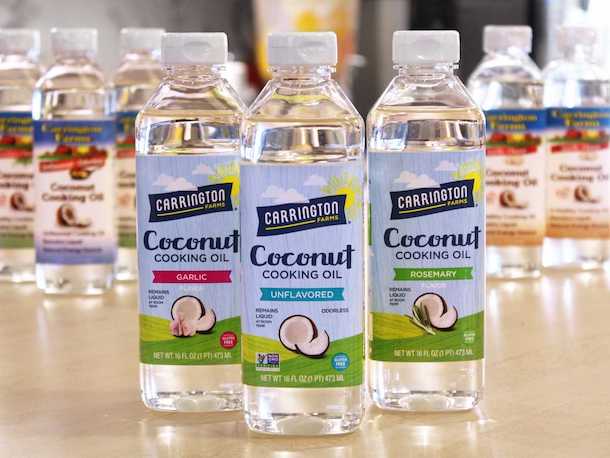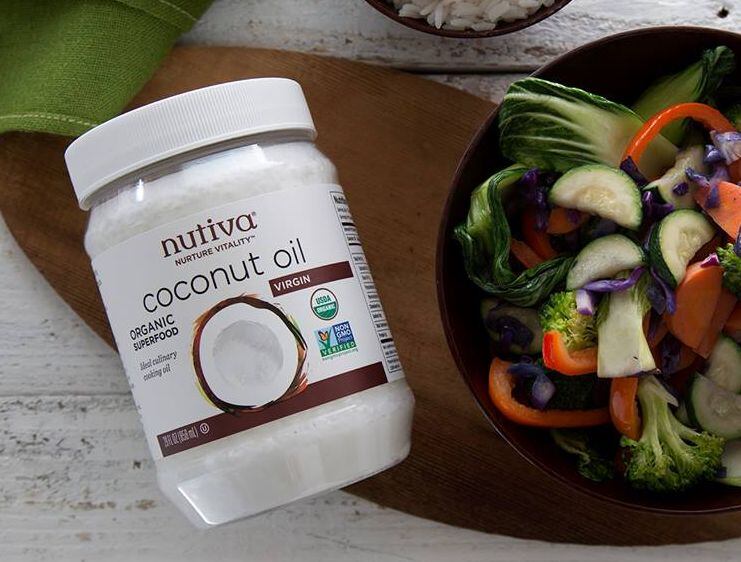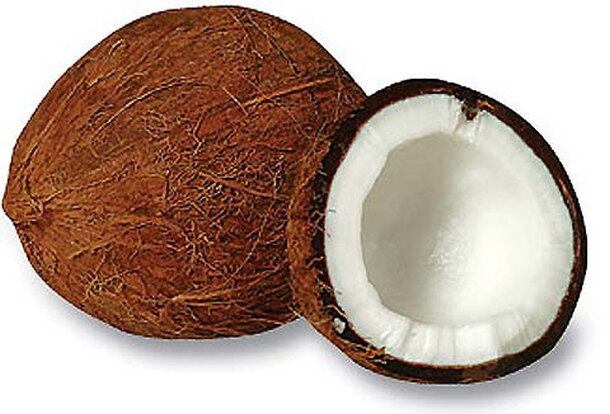The declines have been slightly less pronounced in the natural channel – with sales up 5.4% in 2015, and down 10.1% in 2016 and 16.1% in 2017; with a similar trajectory in the specialty and gourmet channel, where sales were up 2.6% in 2015, and down 10.5% in 2016 and down 14.3% in 2017.
So what is going on? Have consumers turned against coconut oil, or is this just a reflection of the fact that consumers now have so much choice in the culinary oils category that they are simply trying other things as well?
Most likely the latter, speculated SPINS senior nutrition researcher and insights lead Kimberly Kawa: "Perhaps, Medium Chain Triglycerides (aka MCTs), which are a component of coconut oil, have been in the spotlight more [than straight coconut oil for cooking]?
"Another consideration is, since animal protein and animal fats are now more likely to carry label-based attributes with natural product industry appeal [for example on-trend brands such as EPIC Provisions now sell beef tallow, pork lard and duck fat], we are finding consumers picking up a jar of ghee [clarified butter commonly used in South Asian and Middle Eastern cuisines] instead of coconut oil.
"I also want to mention a topic I’ve seen recently in integrative medicine circles. I'm not sure it’s had an impact on sales, but holistic professionals are getting wind of coconut oil and how it may be contraindicated in individuals with autoimmune conditions."
[For example a 2015 paper in the journal Immunity suggested that lauric acid - which is high in coconut oil - tips the balance of T-cells (immune cells) towards the production of inflammation; although there are of course plenty of other articles suggesting that coconut oil has anti-inflammatory effects, so it's hard to know what consumers are paying attention to online.]
Hain Celestial: Roller coaster ride
Commenting on the category’s roller coaster ride during Hain Celestial's second quarter earnings call on February 7, North America CEO Gary Tickle noted that net sales at the firm’s culinary oils brand Spectrum were down around $2m year on year in Q2, “driven primarily by the category decline in coconut oil.”
While the coconut oil category had notched up strong growth in recent years, he added, “That’s flipped over in the last six months in particular; it’s in something like a 23% decline. We are growing share in that business, which is great, but it’s not great when the category is not growing. So, that’s definitely dragging down the overall Spectrum number.”
Carrington Farms: Negative press has impacted the market
Asked for her perspective on the numbers, Carrington Farms chief marketing officer Debbie Shandel said “negative press” over the summer of 2017

had impacted sales, including an advisory from the American Heart Association (more on this later) advising against the use of coconut oil.
According to Shandel: “Our organic virgin coconut oil has, in fact, had an initial dip down about 10-15% but has since leveled off. However, liquid coconut oil sales [Carrington Farms has a liquid coconut oil made using a proprietary distillation process that removes the fatty acids with higher melting points, leading to a product that’s liquid at room temperature] have continued to increase.
“Negative press this past summer has caused some of the fall off of sales on the virgin coconut oil but that has since been debunked and we have seen a leveling off on sales.”
Asked how the AHA advisory had been ‘debunked,’ Shandel cited a small-scale study conducted in the UK for a BBC TV show and an article by Dr. Schoffro Cook, a board-certified doctor of natural medicine and a registered nutritional consulting practitioner.
Nutiva: Consumers are still very interested and loyal to coconut oil
John Roulac, founder of natural products company Nutiva - which also sells coconut oil, told us that, “While there are fluctuations in every category, especially one that has exploded on the scene like coconut oil, we’ve continued to experience steady growth within our portfolio.”

He added: “I think the key here more recently has been our innovation in the space, for example our organic MCT oil and organic liquid coconut oils, which launched with strong consumer response in 2017 and continue to grow.
“We see this as a clear indicator that consumers are still very interested and loyal to coconut oil and are looking for fresh ways to use it. While organic virgin coconut oil is what Nutiva has been best known for, we’re continuing to invest into research and development of novel new coconut oil formats and unique new ways for people to use coconut oil for daily wellness based on the success of our 2017 innovations.”
The saturated fat question
So what do researchers say?
According to USDA charts, coconut oil is higher in saturated fat than butter, lard, palm oil, and beef tallow, which the 2015 dietary guidelines advise Americans to replace with liquid oils higher in mono and polyunsaturated fats.
However, a 2010 meta-analysis published in the American Journal of Clinical Nutrition found “no significant evidence … that dietary saturated fat is associated with an increased risk of coronary heart disease,” prompting some researchers to question whether saturated fat really is the nutritional bogeyman it was once made out to be.
Five years later, another high profile study in the Annals of Internal Medicine concluded that, ‘Current evidence does not clearly support cardiovascular guidelines that encourage high consumption of polyunsaturated fatty acids and low consumption of total saturated fats.”
AHA advisory urges Americans to ‘avoid’ coconut oil
So is coconut oil a ‘healthy’ fat?
According to the 2017 advisory from the American Heart Association (Sacks et al), coconut oil raises LDL (‘bad’) cholesterol. And while it also raises HDL (‘good’) cholesterol, likely due to its high levels of lauric acid, say the authors, this doesn’t necessarily cancel out the effect on LDL, whereas other oils high in mono- and poly-unsaturated fats not only raise HDL but also lower LDL.

“Changes in HDL cholesterol caused by diet or drug treatments can no longer be directly linked to changes in cardiovascular disease (CVD), and therefore, the LDL cholesterol–raising effect should be considered on its own… Because coconut oil increases LDL cholesterol, a cause of CVD, and has no known offsetting favorable effects, we advise against the use of coconut oil.”
Meanwhile, a 2016 meta-analysis of eight clinical trials and 13 observational studies looking into coconut oil and cardiovascular health published in the peer-reviewed journal Nutrition Reviews (Eyres et al) concluded that, "The weight of the evidence from intervention studies to date suggests that replacing coconut oil with cis unsaturated fats would alter blood lipid profiles in a manner consistent with a reduction in risk factors for cardiovascular disease," added the advisory.
However, the authors also acknowledged that, "The effect of coconut consumption on the ratio of total cholesterol to HDL cholesterol was often not examined [in these studies]," and that, "Observational evidence suggests that consumption of coconut flesh or squeezed coconut in the context of traditional dietary patterns does not lead to adverse cardiovascular outcomes."
Professor: ‘Growth in the popularity of coconut oil came almost entirely from the marketing community and not the science community’
So where does that leave consumers?
Tom Sanders DSc, emeritus professor of nutrition and dietetics at King's College in London, UK, and a recognized expert in the relationship between dietary fats and cardiovascular disease risk, told FoodNavigator-USA that the “growth in the popularity of coconut oil came almost entirely from the marketing community and not the science community,” noting that it is “still in full spate in the UK.”
He added: “I think the review by Frank Sacks et al [ie. the AHA advisory] is an accurate reflection of our state of knowledge. I would agree that coconut oil is not a healthy choice as it is high in saturated fatty acids and very low in polyunsaturated fatty acids. This means that it raised blood cholesterol levels more than most other fats. Lauric acid, which is a major component of coconut oil, has the greatest effect of all saturated fatty acids on raising LDL, but it also has the greatest HDL raising effect."

While the LDL raising effect contributes to increased cardiovascular risk, there is "no good evidence to show that the increase in HDL in favorable," he claimed. "While observational studies show that low HDL is associated with increased risk of CVD, genetic studies show that inheriting higher HDL cholesterol does not confer reduced risk of CVD.
“Furthermore, several other factors increase HDL such as polycyclic hydrocarbons, alcohol intake and other xenobiotics. HDL can increase because of a relatively non-specific activation of the peroxysomal oxidation system. HDL could also increase because cholesterol rich HDL particles are not being effectively removed from the circulation. For example, in experiments on animals fed high fat atherogenic diets, there is an increase in HDL with cholesterol.”
Saturated fats and heart health
He added: “Many people cite the health of people in the Pacific Islands and their use of coconut oil. These people now have the worst rates of obesity in the world. In the past, they cooked with coconut but did not use coconut oil. Coconut oil is widely consumed in Kerala State in India and this state has the highest average blood cholesterol level in India (Gupta et al, 2017). A population average cholesterol level is a good predictor of its risk of coronary heart disease (it is not a good predictor of stroke)."
As to the relationship between saturated fatty acids and cardiovascular disease risk, he said, "I think there is an important issue of threshold. The cohort studies in the USA tend to support that replacing saturates with polyunsaturated fatty acids (PUFAs) or even monounsaturated fatty acids (MUFAs) decreases risk, but not replacing them with refined carbohydrates.
“Coronary heart disease (CHD) has fallen markedly by about 66% in Western Europe and saturated fatty acids intakes are around 11-12% energy compared to 20% fifty years ago. PUFA intake has increased owing to increased vegetable oil intake, mainly rapeseed (canola), palm and sunflower seed oil in Europe as opposed to soybean and canola oil in the USA.”
‘It would be a backward step if saturated fatty acid intakes started to creep back to where they were…’
In emerging economies and middle-income countries, however, “there does not seem to be a relationship between saturated fatty acid intake and CHD risk according to the PURE study," conceded Dr Sanders.
"However, total fat and saturated fatty acid intakes were relatively low in those countries.
“There does not seem to be much mileage in pressing for intakes below 10% energy intake. However, it would be a backward step if saturated fatty acid intakes started to creep back to what they were in the 1960s.”
